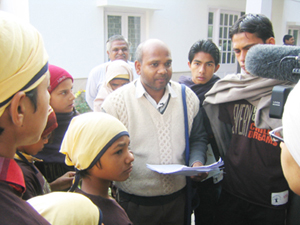
Archive 2009
|
February 16-29, 2008
Children rally against
suicide deaths
An Interview What was the purpose behind the rally of children? Suicide by peasants has been reported in the media since the last 5 years at least. Relief measures have been announced and many promises have been made by the Prime Minister, as well as governments at the centre and the states. But even official statistics show that there is no decline in the suicide cases. We wanted to bring attention to the fact that the peasant is a human being – he or she has a family, including children. We also wanted to raise the issue that for a person to take the terrible step of suicide, the circumstances must indeed have been terrible. The rally highlighted the fact that the urban working class is fully supportive of the cause of rural families. We specifically organised children from families in Punjab to lead the demonstration to dispel the notion that peasant suicides are taking place only in "backward regions", and that Punjab and Haryana, which are touted as model states of the Green Revolution, do not have problems. Our investigation shows that the problems of peasants and therefore the cases of suicides are widespread, and have affected all states and regions, particularly where the Green Revolution took place, and where capitalism has flourished in agriculture. What is the cause of peasants' suicides? The main cause of peasants' suicides is indebtedness to the banks and the moneylenders, including to those who sell them fertilisers, pesticides, etc. The peasant works hard the whole season, and puts the labour of his family to the land to produce this or that crop for the market. The peasant's family has no control over; (1) the price of inputs like seeds, fertilisers, pesticides; (2) no guarantee of the quality of the above, with spurious stuff being often peddled; (3) electricity and water supply are of inadequate quantity in many cases, as well as expensive; (4) the crop could fail for a variety of reasons beyond the peasant's control, and he has no crop insurance; and (5) even if he produces a good crop, its market price will be determined by big Indian and foreign traders in agro commodities, and he may not be able to recover his costs. The peasant takes loans with the hope that he will be able to return the loans and provide for himself and his family. The reality turns out to be different in many cases. In sum, the capitalist orientation of Indian agriculture is leading to intense crisis and ruination of peasants all over the country. What was the response of the agricultural Minister Sharad Pawar to your memorandum? He said that he had no knowledge of peasants' suicides in Punjab, as he had received no such report from the state government. He claimed that his government was providing support prices for farmers in the country. We pointed out that a uniform support price does not work, because what is remunerative in one state may not be adequate in another context. We said the central government’s policy was only addressing the needs of some big farmers, like Badal and himself. He complained that peasants do not sell to the government. We pointed out the obvious to him that they naturally would not when they could get a better price in the mandi! The Minister claimed that WTO and genetically modified (GM) seeds were benefiting the peasants greatly. We pointed out the objective reality that subsidies to Indian peasants can hardly stand comparison with subsidies to US farmers. On GM seeds, the Minister had to agree with us that there has been no research to show that application of such seeds will not harm food security and the environment in the future. We used the opportunity to deliver a lecture to him on the principles of international trade – that it has to be mutually beneficial! In conclusion, the Minister asked us to send him a letter, which he will forward to the Punjab Government, to extend assistance for educating the children of these affected families. |

